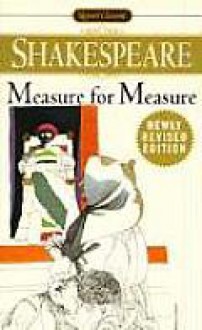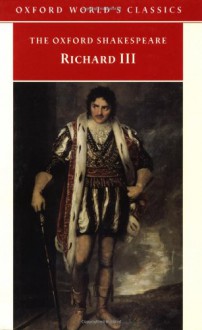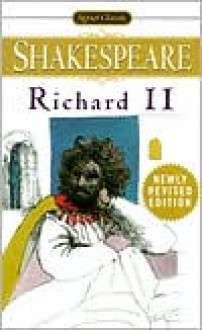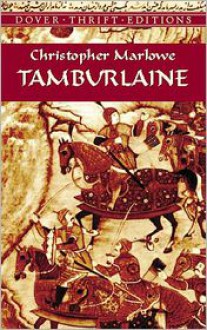
I was going to have a look at both of these plays as a whole, but it appears that both of these plays are in fact a ten act play divided into two parts. This seemed to also be something of a debate with some of Shakespeare's plays, however the ones that are in two, or three, parts (actually, there is only Henry IV in two parts, and Henry VI in three parts, and it could be argued that all of these plays form one continuous play from Richard II to Richard III) seem to have their own internal consistency, of which this play seems to lack. In some cases it could be argued that some of the acts are superfluous as it appears that they are simply a bunch of kings making a stand against Tamburlaine, claiming that their army is bigger than his army, and then getting resoundly defeated by Tamburlaine, and thus starting all over again.
However, it could be argued that both of these plays do have an internal consistency, with the first play looking at the rise of Tamburlaine's power, which concludes with him standing on top of his conquests claiming to be prepared to move out and conquer the rest of the world, and part two dealing with his demise, as he becomes more and more caught up in his own sense of pride and self worth that he steps over the line by burning a copy of the Alcoran, and making mockery of the Muslim god by claiming that if he existed, why did he allow Tamburlaine so many victories.
The play was based on a real person named Timur, and you can read about him here (on Wikipedia). Timur is probably not one of the best known of the conquers (unlike figures such as Napoleon, Hitler, and Genghis Khan) and that is probably because he did not pose mush of a threat to Europe. In fact his war against Bayezid the Turk, who was attacking the Balkans and other parts of Eastern Europe (though Constantinople was still in the hands of the Byzantines at the time), is probably why Timur is considered a popular figure in European History. The other thing about Timur (or Tamurlaine) was that he was from central Asia and was only attempting to follow in the footsteps of Genghis Kahn (of which he failed, when you consider the extent of Genghis Kahn's territory and Timur's territory). He was also seen as being responsible for basically returning Persia, and much of the Middle East, to the stone age, as well as pretty much wiping out most, if not all, of the Nestorian Church (though you must admit that the American adventures in the Middle East in recent times have also assisted in that task).
Anyway, this is a map of Timur's empire:

and this is a picture of Timur himself:
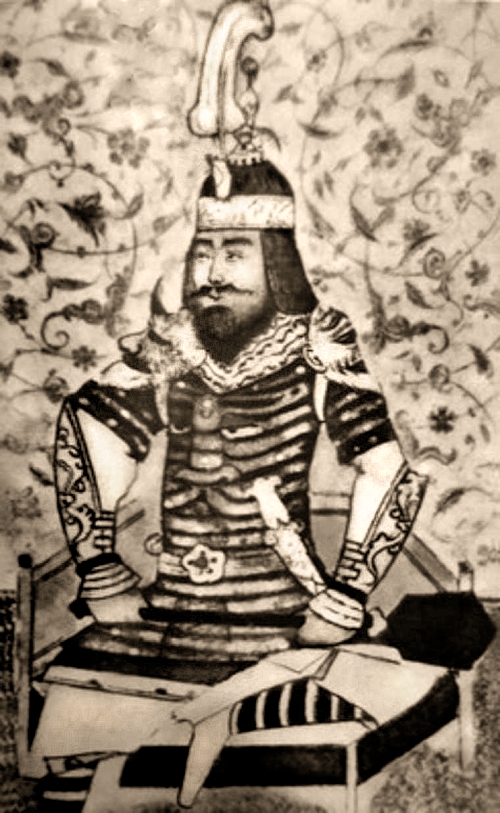
It is interesting though how certain characters are seen differently under a different light. Here Tamurlaine is being painted in a light that is not all that bad, though we must also remember that Marlowe's version does not necessarily have Timur portrayed in the light of a hero, but rather as a conquerer that inevitably overstepped the natural boundaries, in relation to believing he was better than god. Also note that Marlowe uses the Alcoran as the means of his downfall as opposed to the Bible, despite Islam being considered an alien, and in some cases an enemy, culture to that of the Europeans. While this is a broad generalisation, remember that for a period of around four hundred years Europe were sending troops to the Middle East in an attempt to capture Jerusalem, and while the first couple were, to an extent, successful, they began to wane in popularity and effect as time drew on (probably because most of the capable fighting men had been killed off in the first couple of invasions, and also probably because the inhabitants of the Levant had become more prepared in the face of further crusades).
As for the play, and this is the case with many of the plays around this time, the story has been borrowed either from legend or history. Marlowe is doing the same thing that Shakespeare would go on to do with his great tragedies: take a little known character and little known story and turn it into a great play. Notice that it is Hamlet and the Scottish Play that are his most famous, and while they are based upon historical characters and events, they are such minor occurrences that most of us would not realise that these plays have actually been inspired by true stories (in the Hollywood sense of the phrase, of course).
The Ascension of an Emperor (Part 1)
This first part documents the rise of Tamburlaine from a simple goatherd from the plains of Scythia to becoming the emperor of the Middle East. The play opens with the king of Persia being declared Emperor after his army had just sacked India, however one of the reasons for this is because Tamburlaine was a part of his army. However Tamburlaine, who is a cunning general, ends up turning on the emperor of Persia and defeating him and taking his place. However, he is not satisfied at simply taking Persia and moves west to capture Iraq, Syria, Turkey, Egypt, and Arabia. The play then ends with him standing victorious, but looking further West with the dream of conquering and becoming Emperor of Europe.
The thing that I remembered about this play is that there are scenes (I think about two acts worth) where the emperor of Turkey is being carted around in a cage, as if he were an animal. However, I suspect that there is some idea behind this in that what Tamburlaine represents is a reversal. He is a goatherd become emperor, and the other kings, the ones that have arrayed against him, as they are defeated the situation is reversed so that they go from being emperors to little more than animals. In fact, in once scene we have the emperor of Turkey bash himself to death against the cage, and another scene has a king commit suicide at the fear of going from a powerful monarch to a prisoner.
We see this even in our world as well, such as the suicides that occur when there is a stockmarket crash and a billionaire is turned into a destitute. This is the idea of the bankers throwing themselves out of windows in 1929 because they had lost all of their money, or the German millionaire who threw himself in front of a train because he could not handle the idea of living penniless. In a way it goes to show how much of an idea wealth and power can being when somebody will actually commit suicide when that idol deserts them, and in fact when they realise that all of their hopes and dreams were built on nothing more than shifting sands.
The Folly of Pride (Part 2)
I have noticed that there seems to be a lot less reviews of this play than there are of the first one – actually on Goodreads there is only one. Maybe it is because most people either read the two plays as a unity, or maybe they did read both plays, but if they wrote a review, they would have simply written it on the first one. This I can understand because it seems that there is little difference between the two plays with the exception of one act, that being act 1 in the first play (where Tamburlaine first comes onto the scene) and act 5 in the second play (where Tamburlaine finally takes one step two far and ends up dying of a disease).
The reason I say that is because the first play seems to, after the first act, simply have another group of kings appear making statements as to how their army is superior to Tamburlaine, and then they go to war with Tamburlaine and end up losing, and the kings are either captured and reduced to animals, or they end up killing themselves so as to retain at least some form of self respect (in the Ancient World, the act of suicide was seen as an honourable action, especially if it was a choice between poverty, imprisonment, or death – which in many cases is probably still the same today), and then it repeats itself in the next act.
A part of me was hoping to see that what this play encompassed was Tamburlaine's fall, but instead it seemed to have him becoming more powerful and, to put it bluntly, more cocky. In this play we have a number of kings who are defeated in battle, and by the end of the play are pulling Tamburlaine's carriage as if they were horses. Also it seems that we have Tamburlaine extending his kingdon into Egypt, the Levant, and Turkey, and even crossing into Greece and the Balkans, however, near the end of the play, he suddenly decides to turn around and make a path towards Babylon.
This I found rather odd because one would have expected that if he had been conquering the lands off to the west, why would he leave a fortress in the middle of his empire undefeated. Most, if not all, generals worth their salt would at least attempt to make an alliance with them, but would not leave them standing because capturing it would have been a little too hard. This was the case with Tyre and Alexander the Great, and as it turned out, capturing Tyre was not all that difficult anyway, despite the fact that it had been moved onto an island just off shore after Nebucadnezzar had successfully defeated them about three to four hundred years earlier.
However, as I have suggested before, and will continue to suggest, and that is that this play is, to an extent, about the fall of Tamburlaine, despite the fact that most of this occurs in the last act. Here he has finally captured Babylon and is in the library ordering the books be burnt and he is brought a copy of the Koran (written in this play as Alcoran). When presented with the book Tamburlaine mocks the religion upon which it is based, claiming that if Allah had any power whatsoever then he would have intervened and prevented Tamburlaine from conquering all of the said territory (despite the fact that the real Tamburlaine was actually a Muslim and this event would probably not have happened).
It is interesting that Marlowe takes this approach, namely having Tamburlaine mocking a god and the having the said god step out and demonstrating his power by inflicting Tamburlaine with a disease. It is true that the Bible says 'God shall not be mocked' but we see a lot of Bible burning and god mocking in our society (at least towards Christianity) and I must admit that we do get the same statements directed against Islam, and we do not see hordes of god mockers succumbing to disease, though I must admit that in the end everybody dies.
I guess the idea that comes out here is how, in many cases, people like Tamburlaine will, in many cases, end up overreaching and becoming overconfident in their abilities. We see that at the end of the first play where Tamburlaine had already dreamed of taking over the world, and at the end of this play, as he lies on his deathbed, looks at what he hasn't conquered, and then anoints his son to continue where he left off. It is interesting how when we review our lives, many of us look at what we have not accomplished, and actually forget what we have accomplished, and regret what we haven't done rather than look at what we have done.

 Log in with Facebook
Log in with Facebook 
